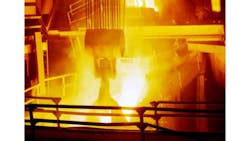The U.S. Environmental Protection Agency recently reported that it reached an agreement with Superior Forge & Steel Corporation over alleged violations of toxic chemical reporting requirements at its plants in New Castle and Pittsburgh, PA. Without admitting any liability, Superior Forge & Steel will pay a $61,673 penalty to settle the allegations.
Superior Forge & Steel is an integrated producer of rolling mill work rolls and backup rolls, with an electric melt shop at New Castle, PA, and a 4,000-ton hydraulic forging press. The press has dual fixed rail manipulator capability, able to forge 60 and 30 metric ton products.
EPA alleged the reporting violations occurred at the New Castle plant in 2010 and 2011, and at a machining operation in Pittsburgh in 2011.
EPA cited Superior Forge for violating the Emergency Planning and Community Right-to-Know Act (EPCRA), a federal law intend to inform the public and emergency responders about the presence of hazardous and toxic chemicals. EPCRA requires businesses to submit annual reports on regulated chemicals, and routine and accidental chemical releases.
In addition, EPCRA requires businesses to report the presence of hazardous chemicals to state and local emergency-response authorities.
EPA alleged Superior Forge did not submit timely annual reports for chromium and lead when the company processed those toxic chemicals in amounts exceeding EPCRA reportable quantities (25,000 lbs. for chromium, 100 lb. for lead).
EPA conducted the inspections after a review of Toxic Release Inventory (TRI) data indicated that there was a gap in the data submitted by the company.
The agency stated that the settlement penalty reflects the Superior Forge & Steel’s cooperation with EPA to resolve the matter and comply with applicable EPCRA requirements.
About the Author
Robert Brooks
Editor/Content Director - Endeavor Business Media
Robert Brooks has been a business-to-business reporter, writer, editor, and columnist for more than 20 years, specializing in the primary metal and basic manufacturing industries. His work has covered a wide range of topics including process technology, resource development, material selection, product design, workforce development, and industrial market strategies, among others.
Currently, he specializes in subjects related to metal component and product design, development, and manufacturing—including castings, forgings, machined parts, and fabrications.
Brooks is a graduate of Kenyon College (B.A. English, Political Science) and Emory University (M.A. English.)

